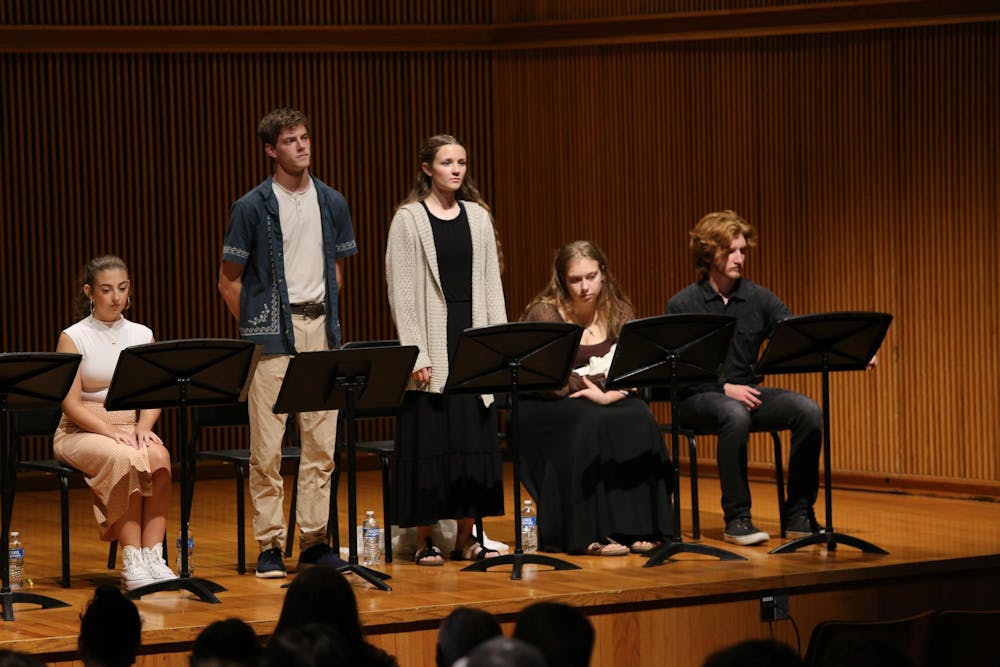A soft, eerie melody seeped through the speakers as Brenna Moan, a junior music composition major, began reading her lines in the Butz-Carruth Recital Hall.
Taylor’s Theatre Department displayed a story of conflict, emotion, mystery and the debate over death. “Will We Ever Be Well?” was a play written by Ris Bland, a senior majoring in musical theater, in collaboration with Tracy Manning, the assistant professor of theatre arts, managing and artistic director of theatre.
The play involved elements of horror as it focused on the leading character Helene Knabe, a physician, and delved into her fictional life as she struggled with a desire for control.
On Sept. 13, the staged reading of “Will We Ever Be Well” came alive in the recital hall. Under a hazy glow, nine performers dressed in blouse tops, black jeans and button-ups, inhaled in preparation.
Bland said she worked on the play six days a week for a month and a half this past summer and finished the fifth draft a week and a half after moving back to Taylor.
“I would sit down and I would write, or I would work,” Bland said. “I would listen to podcasts with the kind of style that I felt like it was going towards—eventually it did get to the point where I was writing for most of the day.”
Bland said that her writing process was fostered through a childhood filled with watching Scooby-Doo and Stephen King.
The showing of the play used the sixth draft Bland composed. She plans on editing it further to be submitted to the Kennedy Center American College Theatre Festival (KCACTF) in November.
Bland said her inspiration came from the true crime stories of Dr. Helene Knabe, a murdered medical pioneer; Alice Martin, the murdered aerialist who died on account of $2.75; Mollie Starbuck, a mother in pursuit of her lost baby and the twins who were possibly born to Mr. and Mrs. Frank McNally.
As a unique horror story, it introduced themes of regret and the need to let go of things that aren’t controllable. This was expounded by gore and death continually throughout the plot.
Bland presented murder cases through a real-world lens, reminding audience members of the 1999 physiological thriller film “The Sixth Sense”.
The night drew a large crowd that remained hushed as two hours flew by. The storyline was filled with deep emotions of anger, confusion, joy and longing.
“It’s a look at death from a lens that isn’t heavy or sad or depressed,” Grace Bradshaw, a sophomore majoring in musical theater, said. “It just kind of takes on a human expression of that.”
Bradshaw, reading for Alice Martin, a murdered professional acrobat, visited Dr. Helene Knabe through her special trapeze talent. Martin’s story included an unappreciative father who came to haunt her in the play.
“Will We Ever Be Well?” introduced relatable characters that dealt with real problems.
Dr. Helene Knabe, read by Emma Reagan, dealt with feeling out of control. She fought with her fiance, assumed a mother role to the twins and regretted the choices she had made in her past. During this time, she struggled with the idea of balancing a profession as a physician while being a wife and mother.
Throughout each scene, the characters' stories developed, drawing each audience member deeper into the plot. Lines would leave an eerie presence in the room that was soon settled by the audience’s uproar of laughter.
“This one, it ends and it makes me want to think, and it doesn’t make me feel defeated, as opposed to other things,” Bradshaw said.
The message of finding purpose and living without regret echoed throughout the auditorium. The fictional characters came alive through nightmares and conversations with those present.
As Bland enters her senior year, she is faced with her looming future just months ahead. Bland wants her audience to exhale and learn from what’s happened in the past, then let go and look to the future.
“I hope people are encouraged to learn from what has happened to them or what they have done, good and bad, and kind of learn to exhale and live with that and live forward out of that,” Bland said.





